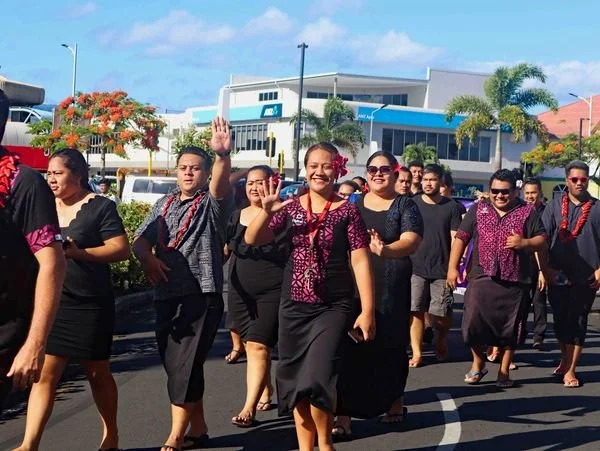Even At Home, Most Samoan Women Are Not Safe: Study
Marchers join a parade on Monday as part of opening ceremonies for the Malu i Fale 16 Days of Activism campaign.
Photo: Government of Samoa
The truth is simple: the women and girls of Samoa are not safe at home.
This is according to statistics presented on Monday by the Minister of Women Community and Social Development (M.W.C.S.D.) Leota Laki Lamositele.
Minister Leota when made mention of the statistics when he delivered the keynote address at the Malu i Fale National 16 Days of Activism Campaign launch.
He pointed to the Samoa Family Safety Study first conducted in 2000 and then in 2017.
There was a 14 percent increase in violence against women in the 17-year period, the study shows.
“The Samoa Family Safety Study conducted in the year 2000 showed that 46 percent of women had experienced domestic violence in their lifetime. The same study was redone in 2017 and it showed that this figure has escalated to 60 percent, an increase of 14 percent,” said the minister of women.
Consultations conducted with stakeholders reported that 87 percent of women experienced threats of violence with 86 percent subjected to physical violence specifically and about 10 percent raped by a family member, he added.
The economic costs of family violence are estimated to be between $98 million and $132 million, which is approximately 6 to 7 percent of Samoa’s Gross Domestic Product (G.D.P.).
The data also shows that majority of the violence cases or incidences occur in the home.
“The statistics above are telling us that our families and communities are not safe, that our children, our people with disabilities, our women and girls and even us men are no longer safe,” Leota said.
“On the 25th of November every year, the world commemorates a violence free day. It launches the beginning of a series of activities to promote a violence-free world. It is also a period to reflect on the many lives affected by the irresponsible actions of various people causing harm to others. It is a continuous plight that has affected most if not all of the countries of the world and Samoa is no exception.”
This year marks the tenth year since Samoa first celebrated the 16 Days of Activism. It has been 10 years of advocacy at all levels, 10 years of reviews, refocusing, reformulation of policies, legislation, planning of frameworks, structures “but sadly with very disappointing results,” the minister of women said.
A few years ago the M.W.C.S.D. and its partners decided to use the analogy of “Malu i Fale, Malu i Fafo” as the overarching theme of its advocacy for its programs on ending violence against women and girls.
“This concept signifies the role of the family as the shelter for each of its members. The ideal representation of the home being a safe haven can be transcribed by the design of a Samoan fale, where the front structure is in coherence with the back structure and the oval sides on both ends basically tighten the whole fale structure allowing for a space in the middle to exist,” Leota said.
“That space is the safe haven for everyone. That is the va-tapuia so that figuratively when you speak or when you act you do not disrupt that space otherwise the house will collapse. It is critical therefore for that space to exist in harmony. Unfortunately, we have not been able to provide adequate support to keep that SPACE in harmony over the past years despite many different approaches and today we are gathered to try once again.”
He said key areas where his ministry can improve on are: Incorporation of our traditional and cultural strengths and knowledge and incorporation of spiritual development as a significant part of our advocacy programs.
The M.W.C.S.D. must also strengthen coordination with the help of communities and partners, create programs that focus on families, improve monitoring and evaluation mechanisms and the way they communicate programs and information.


